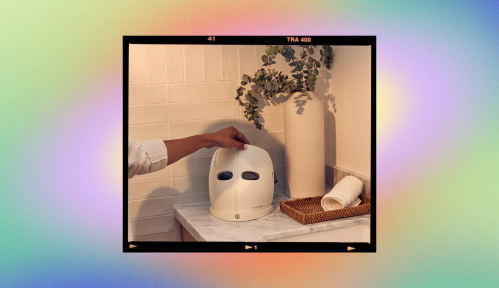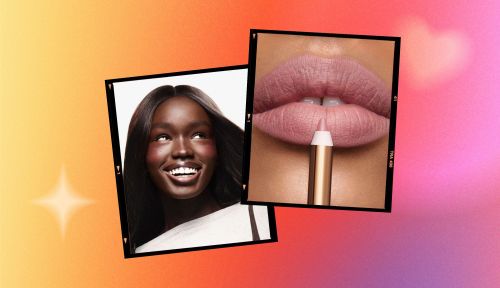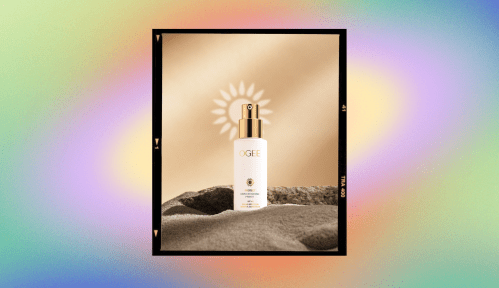Our editors independently select these products. Making a purchase through our links may earn Well+Good a commission
How to use Ayurveda to determine your skin-care routine
Ayurvedic experts share skin-care tips and products based on the three doshas—vata, pitta, and kapha.

Learning about your Ayurvedic dosha can feel a bit like getting your horoscope told. Yes, you think, as the results come in on your “What’s My Dosha?” quiz. That is so me. And when it comes to having your skin essentially “read” based on your dosha alone, the results can be mind-blowingly prescient.
Here’s a quick refresher in case you have no idea what the heck I’m talking about: Ayurveda is an ancient Indian wellness practice that’s been around for 5,000+ years. Practitioners believe that humans fall into one of three “constitutions” called doshas: vata, pitta, and kapha. Your dominant dosha determines everything from your diet, e.g. what your system tolerates and what it does not, to which workout is best-suited for your body, and basically everything in between.
Dosha knowledge can also serve as a shorthand for honing your beauty routine. For example, without ever having met me, Surya Spa founder Martha Soffer predicted, by phone, that my skin was dry. How? She knows I’m vata, and a dehydrated dermis is a dominant characteristic of this dosha.
“All products in Ayurveda are chemical and preservative free and ideally taken from the kitchen and garden.” -Heidi Kinney
The skin-care treatments and products that she, along with other professionals in her field recommend, are ideal for those dedicated to keeping their beauty-routine clean, which is why Ayurvedic beauty is all the rage in the wellness world. “All products in Ayurveda are chemical and preservative free and ideally taken from the kitchen and garden,” says Heidi Kinney who, after six years spent working at renowned Ayurvedic spa and skin care brand Pratima, now practices Ayurvedic beauty at Yoga216 in New York.
Keep reading to get skin-care and product advice tailored to your dosha from two Ayurvedic experts.
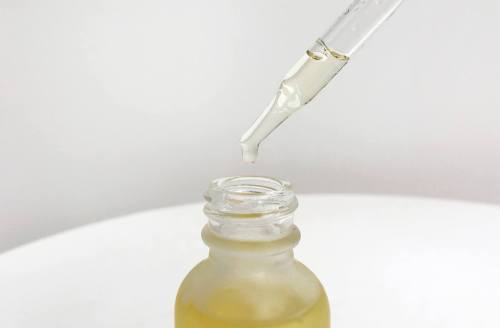
Vata
In a nutshell: DryConcerns: WrinklesFoods to skip: Cold water, cold foods, raw veggies
“Dry, smaller pores and thinner skin make up vata skin,” says Kinney. “It needs to be nourished with oils, and people with vata skin need to keep hydrated internally as well as externally to keep the skin from pre-mature fine lines and loss of elasticity.” She specifically recommends that vata types switch to an oil cleanser, which won’t strip the skin of hydration. “Rosebrook’s Herbal Infusion Oil is a great oil cleanser for vata skin and can also be used as makeup remover and to treat and moisturize the skin,” she says. “This one should always live in your bag for post workout and for travel, especially.”
Soffer, meanwhile, recommends focusing on collagen. To do so, she makes a specific cream for her vata clients, which consists of five different types of milk: goat, cow, sheep, buffalo, and camel, mixed with 32 different herbs as well as agar-agar. (Drinkable collagen can help, too, according to the pros.)
Ayurvedic practitioners believe that skin should be managed from the inside out, so what you ingest makes a critical difference to your skin, she says. Hydration is also critical, but with a caveat. “Vata people love cold water,” she says, noting that due to their cold constitution, people of this dosha should resist their desire for anything icy (even raw veggies!) and instead opt for room temperature-to-hot beverages and warming foods.
Shop vata skin care
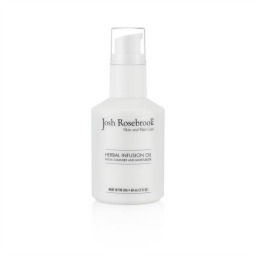
Josh Rosebrook Herbal Infusion Oil $24
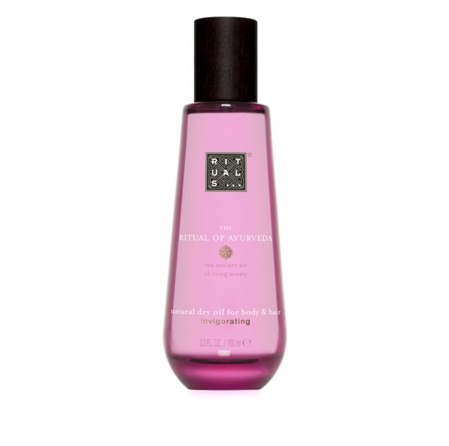
Rituals Ayurvedic Dry Oil $29
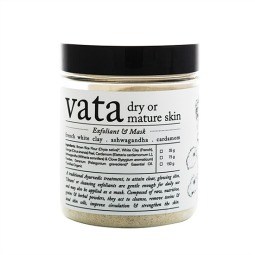
Rasasara Vata Herbal Exfoliant Mask $38

Pitta
In a nutshell: SensitiveConcerns: Acne, rosacea, psoriasis, eczema, dark spotsFoods to skip: Spicy foods, sour foods, acidic foods, alcohol
“Pitta people will normally have acne or rosacea, redness in the skin, and/or very sensitive skin,” says Soffer, noting that they may also suffer from psoriasis or eczema.
Kinney suggests some simple rules to follow. “Keep calm and avoid extreme heat internally and externally,” she says, noting that this dosha tends to run hot. Sun and spicy foods are a no-go. Soffer adds that sour and acidic foods, as well as alcohol, should be avoided.
Both women recommend neem oil—Kinney even calls the antimicrobial and anti-bacterial oil a “go-to” for pitta skin. She makes her own oil blend for pitta clients that includes sunflower oil, neem essential oil, and lavender essential oil to mask neem’s distinctive scent (Note: neem is an essential oil, so it should always be diluted in a carrier oil of some sort). She further utilizes light steams, gentle extractions, facial massages, and healing masks for her pitta clients.
Soffer adds another ingredient to the mix, which addresses a specific issue that potentially plagues pittas. “I make an oil out of an herb called bakuchi (also known as babchi), which is amazing for dark spots,” she says. Rose water is also good for pitta skin thanks to its cooling affects, she says.
Shop pitta skin care

Floracopeia Neem Essential Oil $10
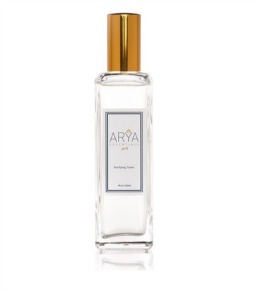
Arya Purifying Toner $50

Paavani Ayurveda Pitta Mask $24
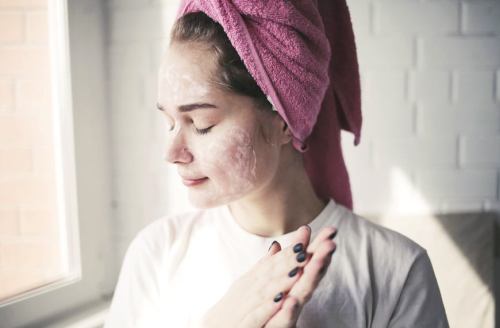
Kapha
In a nutshell: Normal to oily (especially in the T-zone)Concerns: Clogged poresFoods to skip: Fried foods, dairy, red meat, processed sugars
“Pores are larger and skin tends to be oily” for kapha doshas, Kinney says, noting that for this reason, kaphas benefit from gentle exfoliation to keep the skin free and clear of congestion.
To properly slough off the skin, Kinney suggests the use of an Ubtan powder. “It’s Ayurveda’s flour exfoliator and can also be used as a mask,” she says, noting that all skin types can benefit from Ubtans as long as a doshic-specific flour is used for the skin. For kapha, chickpea flour is recommended. “Mix chickpea flour with water, then exfoliate in a circular motion, adding water as you go so the fingers move easily over the skin” she advises. “Then, let the mixture dry for 30 seconds and, with dry hands, begin to exfoliate the skin in upward direction (side-to-side on the forehead), letting the chickpea flour fall off.” After, she says, skin will be prepped to take on a mask or oils more effectively.
Soffer agrees that kapha skin tends to be oily, and specifically cautions that the T-zone can cause trouble for this dosha. With respect to diet’s affect on the skin, she further warns that kapha people should stay away from food that is overly fatty. According to Kinney, there is good news for those kapha doshas: “Kapha skin ages the best out of the three skin types.”
Shop kapha skin care
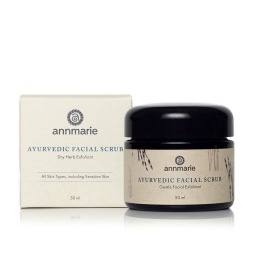
Annmarie Ayurvedic Facial Scrub $30
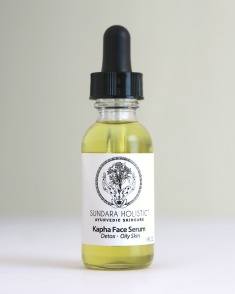
Sundara Holistic Kapha Face Serum $45
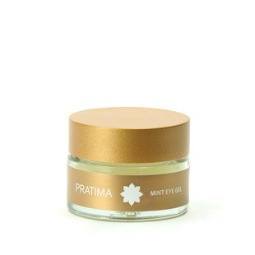
Pratima Refreshing Mint Eye Gel $36
Since the basis of Ayurvedic beauty is diet, it might be helpful to start your practice with these 9 Ayurvedic secrets to great digestion. Plus, find out what it means to stay hydrated, the Ayurvedic way.

